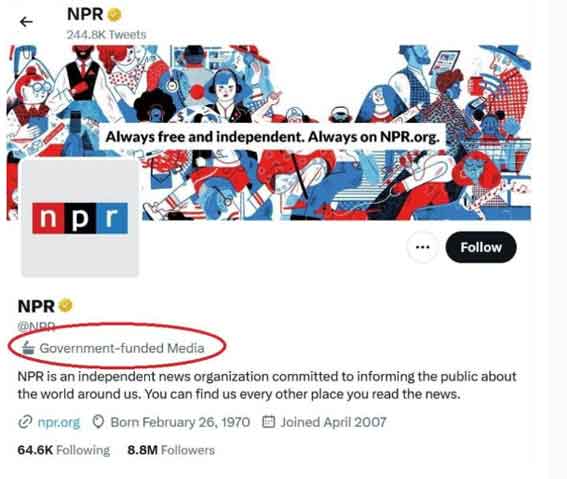
To its credit, Twitter acknowledged the justice of NPR's objection. On April 10 it changed the tag to "Government-funded Media," a much more accurate label, comparable to the one it applies to tweets from the BBC and Voice of America. Yet far from being mollified by Twitter's willingness to correct its description, NPR had a hissy fit. On April 12, it announced that it was suspending all activity on Twitter. "We are not putting our journalism on platforms that have demonstrated an interest in undermining our credibility," NPR fumed in a statement. "We are turning away from Twitter." Some individual public radio stations followed suit. Margaret Low, the CEO of Boston's WBUR, said her station would stop tweeting "in solidarity with NPR," accusing Twitter and its owner Elon Musk of "seek[ing] to undermine the integrity of our news organizations."
But Twitter had undermined neither the credibility nor the integrity of NPR and its affiliates. It had merely pointed out that they are subsidized with public funds. For some reason, NPR — along with PBS, which likewise stormed off the social media site last week — hates when attention is drawn to its government largesse. (As Musk put it: "Publicly funded PBS joins publicly funded NPR in leaving Twitter in a huff after being labeled ‘Publicly Funded.'") NPR and its allies routinely claim that the issue of federal funding is raised only as a red herring, since — they say — the amount of taxpayer dollars NPR receives is too trivial to affect its work. Yet NPR also claims that "federal funding is essential to public radio's service to the American public and its continuation is critical." Well, which is it? Too minuscule for the public to care about? Or a lifeline without which public broadcasting would dry up?
"Presently, NPR receives funding for less than 1 percent of its budget directly from the federal government," explained Influence Watch, a project of the nonprofit, nonpartisan Capital Research Center, "but receives almost 10 percent of its budget from federal, state, and local governments indirectly."
Once upon a time there may have been a plausible justification for NPR's government subventions. When it was founded more than half a century ago, NPR could accurately be said to be supplying news and educational content that listeners couldn't get anywhere else. That argument is utterly implausible today, when audio programming of every description can be found amid a vast array of outlets: terrestrial and satellite radio, on-demand broadcasters, podcasts, and audio downloads. If NPR were to vanish overnight, listeners would hardly be trapped in a cone of silence. They would simply "have to make do," as George F. Will remarked in 2017, "with America's 4,666 AM and 6,754 FM commercial stations, 437 satellite radio channels, perhaps 70,000 podcasts, and other Internet and streaming services."
At a time of trillion-dollar federal deficits and a national debt approaching $32 trillion, NPR's government subsidies cannot possibly be justified. That's particularly true when public radio attracts a fortune in private funding, from the donations made by innumerable "listeners like you," to the $135 million in corporate sponsorships it harvested last year. As of Dec. 31, NPR's balance sheet showed more than $780 million in assets, against less than $270 million in liabilities.
I oppose any government funding of public radio and TV on First Amendment grounds: To my mind, neither Congress nor any state has a right or a legitimate reason to control, influence, or subsidize domestic media. But even people who believe Congress does have such power should be able to recognize by now that public broadcasting would be healthier and happier if, once and for all, it broke its addiction to taxpayer dollars.
This has nothing to do with NPR's pronounced left-wing tilt, however irritating it can sometimes be. Some of my best friends, to coin a phrase, work in public radio, and much of what they produce is first-rate. NPR and its affiliates have broken countless important news stories and generated thousands of hours of absorbing, intelligent, and illuminating content. But the same can also be said about innumerable other media outlets, left, right, and nonpolitical. If The New York Times, The Christian Broadcasting Network, Bloomberg Radio, The Boston Globe, The Food Network, The Chronicle of Higher Education, Fox News Channel, The Wall Street Journal, The Salem Radio Network, and so many other broadcasters and publications can operate without being on the government dole, National Public Radio can too.
No one is going to lose any sleep because NPR has stopped tweeting. But if it irks public radio's honchos to be publicly identified as "government-funded media," they have a more effective remedy than giving Twitter the silent treatment. They could stop taking government funds. Millions of NPR listeners and supporters would step up to replace any lost revenue. And Elon Musk would have no choice but to remove that tag.
Jeff Jacoby is a columnist for The Boston Globe, from which this is reprinted with permission."


 Contact The Editor
Contact The Editor
 Articles By This Author
Articles By This Author